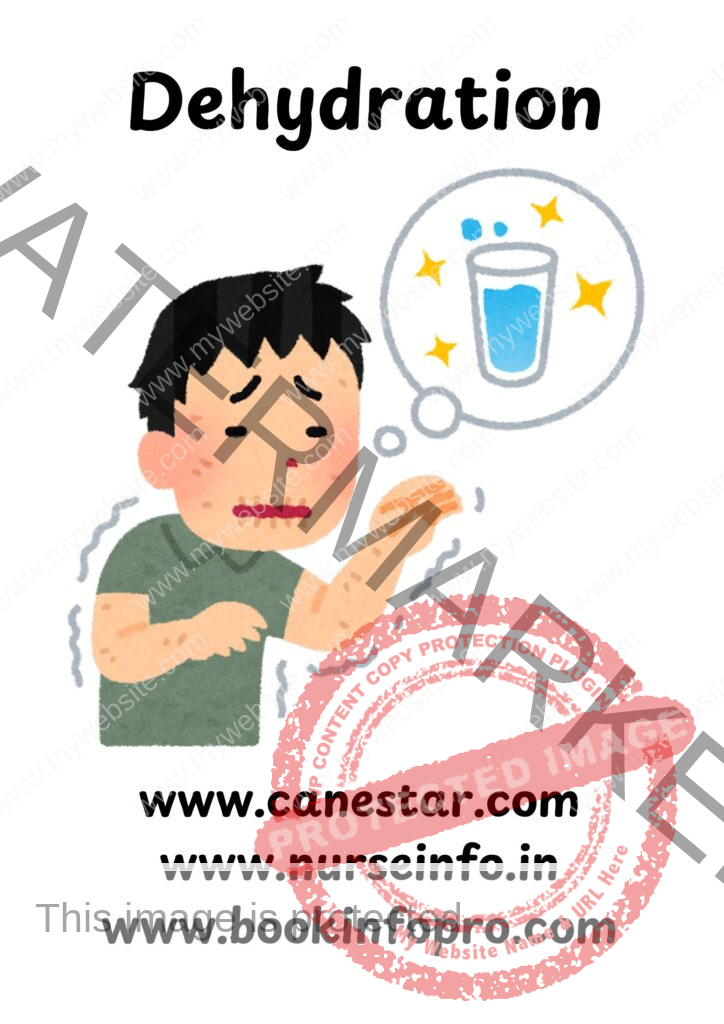Dehydration – Definition, types, causes, signs and symptoms, diagnosis, treatment and prevention
Dehydration – Definition, types, causes, signs and symptoms, diagnosis, treatment and prevention
Dehydration occurs when the body loses more fluids than it takes in, leading to an insufficient amount of water to carry out normal bodily functions. It can be mild, moderate, or severe, depending on the amount of fluid loss.
Causes:
- Inadequate fluid intake: Especially during hot weather, exercise, or illness.
- Excessive fluid loss: Vomiting, diarrhea, fever, excessive sweating, or increased urination (as in diabetes or diuretic use).
- Conditions like burns, which can lead to fluid loss through damaged skin.
Pathophysiology:
- The body relies on fluids to maintain cellular function, blood volume, and electrolyte balance.
- As dehydration occurs, plasma volume decreases, leading to reduced perfusion of tissues.
- This triggers mechanisms like increased thirst and reduced urine output to conserve water.
- Severe dehydration affects organ systems, potentially leading to shock, kidney failure, or death.
Signs and Symptoms:
Mild to moderate dehydration:
- Thirst
- Dry mouth and mucous membranes
- Decreased urine output or dark-colored urine
- Fatigue, dizziness, or light-headedness
- Headache
- Muscle cramps
Severe dehydration:
- Rapid heartbeat (tachycardia)
- Low blood pressure (hypotension)
- Dry skin that lacks elasticity (poor skin turgor)
- Sunken eyes
- Confusion or irritability
- Absence of sweat or tears
- Rapid breathing
- Loss of consciousness
Diagnosis:
- Physical examination: Skin turgor, sunken eyes, dry mucous membranes, vital signs.
- Lab tests: Blood tests to check electrolyte levels, blood urea nitrogen (BUN), creatinine, and hematocrit levels.
- Urine tests: To assess concentration and volume of urine output.
Treatment:
- Mild to moderate dehydration: Can often be treated with oral rehydration therapy (ORT) using water, oral rehydration salts (ORS), or electrolyte-containing fluids.
- Severe dehydration: Requires intravenous (IV) fluids, such as normal saline or Ringer’s lactate, to restore fluid and electrolyte balance quickly.
Prevention:
- Drink adequate fluids, especially during physical activity, hot weather, or illness.
- Use electrolyte solutions during prolonged exercise or heat exposure.
- Monitor fluid intake and output in patients at risk, such as the elderly or those with illnesses causing vomiting or diarrhea.
Complications:
- Electrolyte imbalances: Leading to conditions like hypokalemia (low potassium) or hypernatremia (high sodium).
- Kidney damage: Prolonged dehydration can reduce blood flow to the kidneys, leading to acute kidney injury.
- Heatstroke: In cases of extreme heat and dehydration, leading to overheating of the body.


